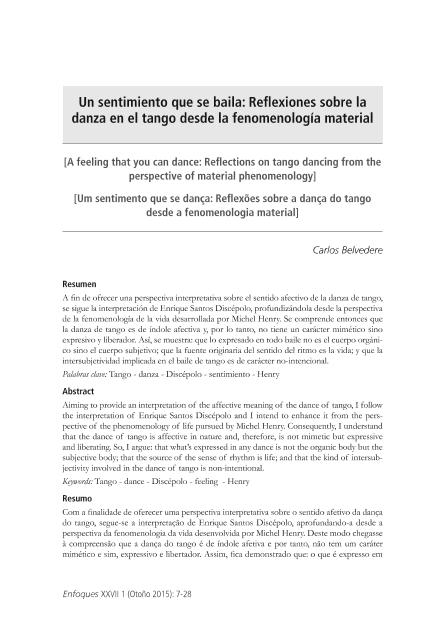Mostrar el registro sencillo del ítem
dc.contributor.author
Belvedere, Carlos Daniel

dc.date.available
2018-07-17T13:16:16Z
dc.date.issued
2015-04
dc.identifier.citation
Belvedere, Carlos Daniel; Un sentimiento que se baila: Reflexiones sobre la danza en el tango desde la fenomenología material; Universidad Adventista del Plata; Enfoques; XXVI; 1; 4-2015; 7-28
dc.identifier.issn
1514-6006
dc.identifier.uri
http://hdl.handle.net/11336/52341
dc.description.abstract
A fin de ofrecer una perspectiva interpretativa sobre el sentido afectivo de la danza de tango, se sigue la interpretación de Enrique Santos Discépolo, profundizándola desde la perspectiva de la fenomenología de la vida desarrollada por Michel Henry. Se comprende entonces que la danza de tango es de índole afectiva y, por lo tanto, no tiene un carácter mimético sino expresivo y liberador. Así, se muestra: que lo expresado en todo baile no es el cuerpo orgánico sino el cuerpo subjetivo; que la fuente originaria del sentido del ritmo es la vida; y que la intersubjetividad implicada en el baile de tango es de carácter no-intencional.
dc.description.abstract
Aiming to provide an interpretation of the affective meaning of the dance of tango, I follow the interpretation of Enrique Santos Discépolo and I intend to enhance it from the perspective of the phenomenology of life pursued by Michel Henry. Consequently, I understand that the dance of tango is affective in nature and, therefore, is not mimetic but expressive and liberating. So, I argue: that what’s expressed in any dance is not the organic body but the subjective body; that the source of the sense of rhythm is life; and that the kind of intersubjectivity involved in the dance of tango is non-intentional.
dc.description.abstract
Com a finalidade de oferecer uma perspectiva interpretativa sobre o sentido afetivo da dança do tango, segue-se a interpretação de Enrique Santos Discépolo, aprofundando-a desde a perspectiva da fenomenologia da vida desenvolvida por Michel Henry. Deste modo chegasse à compreensão que a dança do tango é de índole afetiva e por tanto, não tem um caráter mimético e sim, expressivo e libertador. Assim, fica demonstrado que: o que é expresso em toda dança não o corpo orgânico, se não que é o corpo subjetivo; que a fonte originária do sentido do ritmo é a vida, e que a intersubjetividade implícita na dança tango é de caráter não intencional.
dc.format
application/pdf
dc.language.iso
spa
dc.publisher
Universidad Adventista del Plata
dc.rights
info:eu-repo/semantics/openAccess
dc.rights.uri
https://creativecommons.org/licenses/by-nc-sa/2.5/ar/
dc.subject
Tango
dc.subject
Danza
dc.subject
Díscépolo
dc.subject
Sentimiento
dc.subject
Henry
dc.subject.classification
Otras Sociología

dc.subject.classification
Sociología

dc.subject.classification
CIENCIAS SOCIALES

dc.title
Un sentimiento que se baila: Reflexiones sobre la danza en el tango desde la fenomenología material
dc.title
A feeling that you can dance: Reflections on tango dancing from the perspective of material phenomenology
dc.title
Um sentimento que se dança: Reflexões sobre a dança do tango desde a fenomenologia material
dc.type
info:eu-repo/semantics/article
dc.type
info:ar-repo/semantics/artículo
dc.type
info:eu-repo/semantics/publishedVersion
dc.date.updated
2018-07-11T18:10:02Z
dc.journal.volume
XXVI
dc.journal.number
1
dc.journal.pagination
7-28
dc.journal.pais
Argentina

dc.description.fil
Fil: Belvedere, Carlos Daniel. Universidad Nacional de General Sarmiento; Argentina. Universidad de Buenos Aires; Argentina. Consejo Nacional de Investigaciones Científicas y Técnicas; Argentina
dc.journal.title
Enfoques
dc.relation.alternativeid
info:eu-repo/semantics/altIdentifier/url/http://publicaciones.uap.edu.ar/index.php/revistaenfoques/article/view/51
dc.relation.alternativeid
info:eu-repo/semantics/altIdentifier/url/http://ref.scielo.org/rv3gs6
dc.relation.alternativeid
info:eu-repo/semantics/altIdentifier/url/http://www.redalyc.org/articulo.oa?id=25955331002
Archivos asociados
